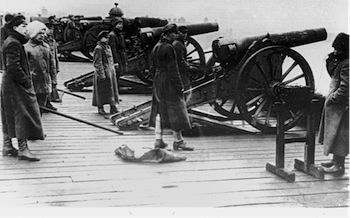

|
Bolshevism in Retreat  The bombardment of Kronstadt Once the Whites had been defeated the peasants turned against the Bolsheviks, whose requisitionings had brought much of rural Russia to the brink of starvation. By the autumn of 1920 the whole of the country was inflamed with peasant wars. The consignment of grain to the cities had been brought to a halt within the rebel strongholds. As the urban food crisis deepened, workers went on strike. The strikes that swept across Russia during February 1921 were no less revolutionary than the peasant rebellions. Workers had been angered by the Bolsheviks' attempts to subordinate trade unions to the party-state. In 1920 a Workers' Opposition emerged within the party to defend the rights of the unions in management. A rash of workers' meetings called for an end to the Communists' privileges, the restoration of free trade and movement (allowing them to barter with the peasants), of civil liberties and the Constituent Assembly. The rebellion spread to the Kronstadt naval base. In 1917 Trotsky had called the Kronstadt sailors the 'pride and glory of the Russian revolution'. They had played a key role in bringing the Bolsheviks to power. But now they called for the end of their dictatorship and elected a new Soviet. Trotsky was sent to Petrograd to take command of the suppression of the mutiny and on 7 March the assault began with a bombardment of the naval base. |
© 2014 Orlando Figes | All Rights Reserved